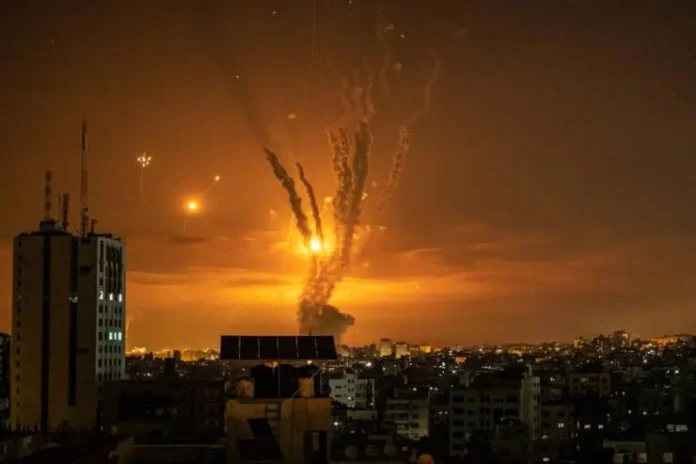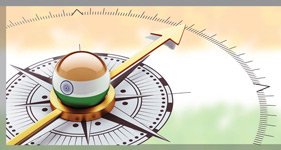War clouds have been hovering over the Middle East for quite some time now. With the October 7 terror attack in southern Israel by the terrorist group Hamas, it was quite clear that a confrontation between Israel and Iran would be around the corner. However, the scale and intensity of the showdown have shocked the world.
Israel is fighting Hamas in Gaza in a war that has already claimed over 35,000 lives with many more people dying day in and day out. However, there seems to be little progress in putting an end to the war, which has become all the more egregious. But one thing that is very clear is that human lives do not matter for the countries involved in a proxy war against their adversaries.
The realist school of international relations posits that states seek to increase their power to enhance their chances of survival in the anarchical international system. Is this then an existential crisis for both Iran and Israel? This question is difficult to answer.
Following the fierce Iranian reprisal, many world powers urged both sides to exercise restraint. India was one of these countries. The external affairs ministry urged both sides to show restraint and take active steps to de-escalate the situation. Besides, India also asked Israel and other Arab powers to find a concrete way to defuse the humanitarian crisis in Gaza that threatens to acquire famine proportions.
The event that triggered the crisis
Last week, Israel carried out an airstrike deep inside Syrian territory, the target was, however, a sensitive one – the Iranian embassy compound. The strike dealt substantial damage to the Iranian embassy compound, the damage was so severe that several Iranian diplomats and soldiers were killed in the daring raid. But what is of prime importance in this attack included one of the most high-profile targets – Mohammed Reza Zahedi. He was a serving brigadier general of the Quds Force, the elite external arm of the Iranian Revolutionary Guard Corps (IRGC).
The man was the mastermind of several attacks on American and Israeli targets, Western reports have claimed. Needless to say, the attack sparked an outburst of anger in Iran. Tehran vowed revenge and resolved to “rain hell” upon Israel.
This was the second time that an important member of the Quds Force had been targeted by the West. The first victim was Major General Qassim Solemani who was assassinated in a drone strike outside the Baghdad airport.
In international politics, a small event can trigger a chain of reactions and counter-reactions leading to the escalation of matters that may eventually cause a catastrophe. The assassination of the Austro-Hungarian heir apparent Archduke Francis Ferdinand was one such event that led to World War I. Likewise, this event may have the potential to trigger a bigger crisis.
The realist school of international relations posits that states seek to increase their power to enhance their chances of survival in the anarchical international system. Is this then an existential crisis for both Iran and Israel? This question is difficult to answer
India – the beacon of hope
This stand has shown how Indian diplomacy has evolved throughout this conflict. In the immediate aftermath of the October 7 attack, External Affairs Minister Dr S Jaishankar described the Hamas incursion as a terror attack. Fast forward to February, Bharat demanded the resolution of the conflict in Gaza and voiced its opinion favourably for a ceasefire in Gaza.
With regard to this event, India has urged immediate diplomacy to prevent the situation from escalating further and urged both Iran and Israel to maintain international peace and security and uphold the laws and principles of the UN charter.
In this context, it is clear that India has emerged as a beacon of hope, it is the only country that enjoys robust ties with Persia and Israel. India should actively consider playing shuttle diplomacy to neutralise the crisis and bring both sworn foes to the negotiating table.
It is clear that India has emerged as a beacon of hope, it is the only country that enjoys robust ties with Persia and Israel. India should actively consider playing shuttle diplomacy to neutralise the crisis and bring both sworn foes to the negotiating table
While this appears seemingly impossible, the diplomatic capital Bharat enjoys in both countries is resilient enough to ensure a breakthrough in the otherwise hostile relations between these two countries.
Diplomacy is the way forward for both Israel and Iran and a peaceful Middle East is the way forward for India, especially from the economic and geopolitical perspectives.
–The writer is currently working as a Research Associate at Defence Research and Studies (dras.in) and is a columnist. The views expressed are personal and do not necessarily reflect the views of Raksha Anirveda
–The writer is currently working as a Research Associate at Defence Research and Studies (dras.in) and is a columnist. The views expressed are personal and do not necessarily reflect the views of Raksha Anirveda














